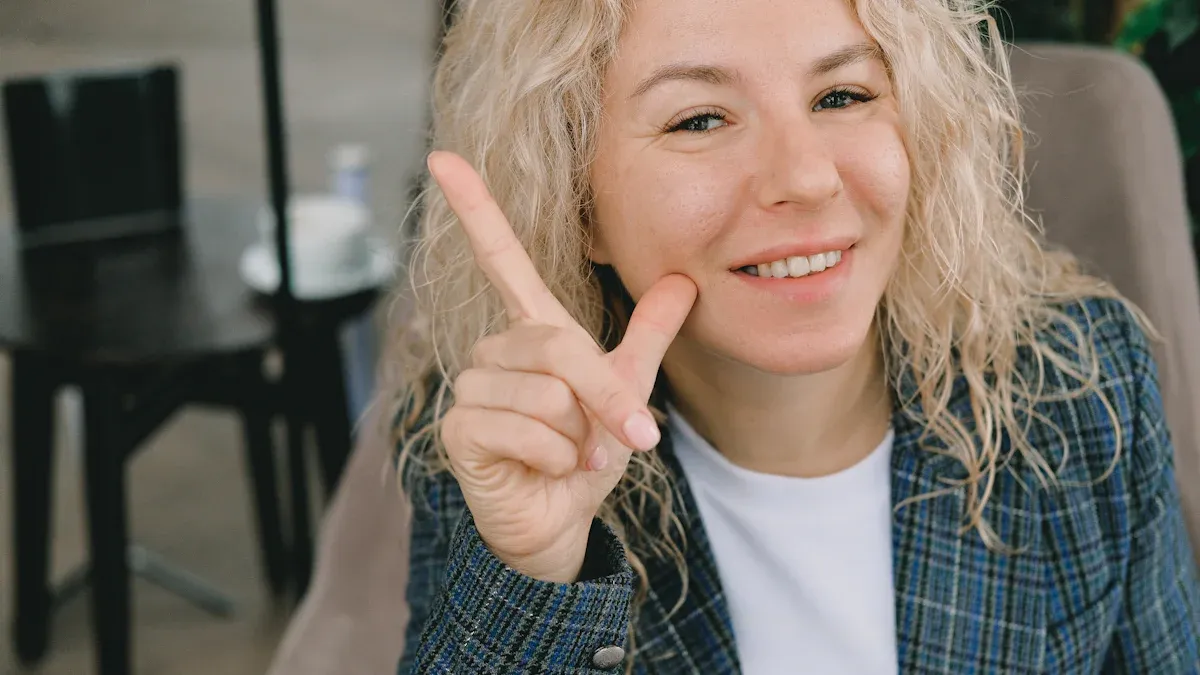Building confidence is a key step in learning how to be more attractive. When you feel good about yourself, your behavior changes in a noticeable way. People pick up on this shift immediately. Research shows that being confident in how you look boosts your self-esteem, which in turn makes you more attractive to others.
Aspect | Finding |
|---|---|
Self-confidence | Raises self-esteem and increases likability |
Self-perception | Strongly influences how others perceive you |
If you want to know how to be more attractive, start by recognizing your own value. Taking small, consistent steps can lead to significant improvements.
Key Takeaways
Real confidence comes from knowing what you are good at and what you are not. It means being humble and kind to others. This real confidence helps people trust you and want to be around you.
Having a growth mindset helps you see hard things as ways to learn. Talking nicely to yourself and accepting who you are makes you feel better about yourself. This also makes you more likable to others.
Try to do things every day like looking people in the eye, using open body language, and practicing social skills. Taking small steps and doing them often helps you feel more confident and get along with people better.
Why Confidence Attracts

The Confidence Effect
Confidence makes people want to be near you. When you believe in yourself, you give off good vibes. Others see your body language and your smile. They notice how you talk and move. You stand up straight and walk with a goal. People feel safe around you because you look sure of yourself. This feeling makes them want to hang out with you.
Confidence works like a magnet. It brings people close and makes them want to hear you.
You do not have to be perfect. You just need to believe in your own value. When you act confident, you help others feel better too. This starts a chain of good feelings. People start to look up to you and respect you.
Genuine vs. Fake Confidence
Confidence is not always real. Real confidence means you know your good points and your weak spots. Fake confidence tries to hide problems and can push people away. People can tell if it is real or not.
Here is how real and fake confidence are different:
Aspect | Genuine Confidence | Fake Confidence |
|---|---|---|
Openness to Learning | Admits knowledge gaps; asks for help; willing to learn and grow. | Denies gaps; avoids help; unwilling to learn. |
Mistakes | Accepts responsibility; learns and moves on. | Blames others; hides or magnifies mistakes; repeats errors. |
Humility | Humble; relies on substance over style; does not seek attention. | Arrogant; overacts confidence; deflects or attacks challengers. |
Consistency | Steady and independent; confidence rooted in values and beliefs. | Situational; seeks external validation; inconsistent. |
Generosity | Gives freely of time, knowledge, and support; forgiving and conflict-resolving. | Protective; stingy with resources; defensive; escalates conflicts. |
Social Outcomes | Builds strong connections; inspires trust and support. | Isolates self; creates distrust and negativity. |
When you show true confidence, you earn trust and make good friends. People feel safe with you. They see you are honest and nice. This makes you really attractive.
How to Be More Attractive with Confidence
Mindset Shifts
You can change how you see yourself by shifting your mindset. When you believe you can grow and improve, you start to feel more confident. This is called a growth mindset. People with a growth mindset see challenges as chances to learn, not as failures. They know that skills and confidence can get better with practice.
Growth mindset helps you bounce back from setbacks.
You learn to see mistakes as lessons, not as proof you are not good enough.
You start to believe you deserve good things and can achieve your goals.
Mindset Shift Component | Description | Psychological Effect |
|---|---|---|
See tough times as challenges, not roadblocks. | Feel more satisfied and confident in life. | |
Self-Efficacy | Trust your ability to handle problems. | Build mental strength and keep a positive mindset. |
Mental Toughness | Stay strong even when things get hard. | Keep your confidence steady over time. |
When you focus on learning and growing, you become more open and resilient. This makes you stand out. People notice your positive attitude and want to be around you. If you want to know how to be more attractive, start by believing you can change and improve every day.
Self-Acceptance
Self-acceptance means you like yourself as you are. You do not need to be perfect. You do not have to look or act like anyone else. When you accept yourself, you feel more relaxed and happy. This calm confidence draws people to you.
Research shows that self-acceptance boosts your self-esteem and lowers anxiety. When you stop comparing yourself to others, you feel better about who you are. People see this confidence and feel comfortable around you. They notice your kindness and honesty.
Tip: Focus on your health and self-care, not on meeting other people’s standards. This helps you feel good inside and out.
If you want to learn how to be more attractive, practice self-acceptance every day. Smile at your reflection. Celebrate your small wins. Remember, your personality and emotions add to your beauty.
Embracing Uniqueness
Your unique traits make you special. Maybe you have a quirky laugh, freckles, or a creative way of thinking. These things set you apart. When you embrace what makes you different, you show real confidence.
Psychologists say that accepting your unique features leads to happiness and self-esteem. You feel more connected to your true self. This makes you act with honesty and courage. People are drawn to your authenticity.
Use positive affirmations to remind yourself of your strengths.
Set boundaries to protect your energy and values.
If you want to know how to be more attractive, let your true self shine. People love to see someone who is proud of who they are. Your confidence will inspire others to do the same.
Positive Self-Talk
The way you talk to yourself matters. Positive self-talk means telling yourself you can do hard things. It means cheering yourself on instead of putting yourself down. This habit builds your confidence and helps you stay calm in tough moments.
Say, “I can handle this,” when you feel nervous.
Remind yourself of times you succeeded before.
Avoid harsh words and focus on what you do well.
Studies show that positive self-talk improves performance and lowers anxiety. When you speak kindly to yourself, you feel more confident. Others notice your calm energy and want to spend time with you.
If you want to learn how to be more attractive, start with your inner voice. Encourage yourself every day. Your confidence will grow, and so will your appeal to others.
Daily Habits for Confidence
Social Skills Practice
You can get more confident by practicing social skills every day. Try talking with your family at dinner. Join a group activity at school or in your neighborhood. These things help you learn to listen and share. You also learn how to be kind to others. When you help a friend or volunteer, you feel good about yourself. You start to believe you can make a difference.
When you are kind and caring, people notice. These traits help you make friends and become more likable.
Storytelling and Curiosity
Telling stories is a great way to connect with people. When you share your own stories, others pay attention. Storytelling lets you show who you are. Even if you are shy, telling a story helps you open up. People see you as fun and brave.
Telling stories helps people feel close to each other.
Sharing stories helps you understand yourself and set goals.
Being curious makes you ask questions and learn new things. This makes talking with others more fun.
Public Speaking and Activities
Speaking in front of others can be scary at first. But each time you try, you get a little braver. Public speaking and group activities help you face your fears. You learn to focus on what you want to say. Over time, you will see your confidence grow.
Be proud of every small step you take.
Setting Boundaries
Setting boundaries means knowing what you are okay with. It also means telling others what you need. Saying “no” is sometimes important. This helps you take care of yourself. Good boundaries show you respect yourself. Others will respect you too. This helps you feel stronger and have better friendships.
Confident Body Language

Eye Contact
You can show confidence with your eyes. When you look people in the eye, you show that you care and that you are sure of yourself. Studies show that eye contact makes you seem more attractive and trustworthy. People feel respected and noticed when you meet their gaze. If you avoid eye contact, others might think you feel nervous or uninterested. Try to hold eye contact for a few seconds at a time, then look away naturally. Pair your gaze with a smile to boost your charm even more. Remember, too much staring can feel uncomfortable, so find a balance that feels friendly.
Tip: Good eye contact helps you connect and makes others want to listen to you.
Posture and Gestures
Your posture tells a story before you even speak. Stand tall with your shoulders relaxed. Open gestures, like uncrossed arms and hands you can see, show that you are open and ready to engage. Research shows that open postures make you look powerful and help you feel more confident inside. Closed postures, like crossed arms, can make you seem shy or defensive. Use smooth, broad gestures when you talk. Walk with purpose, as if you know where you are going. These habits help others see you as a leader and someone they can trust.
Grooming and Self-Care
Taking care of yourself is a sign of self-respect. Regular grooming, like brushing your hair and wearing clean clothes, boosts your mood and confidence. Studies say that when you look good, you feel good. This feeling shows in how you act and how others see you. Grooming routines also help lower stress and make you feel calm. When you care for yourself, you send a message that you value who you are. Others notice this and feel drawn to your positive energy.
Overcoming Obstacles
Handling Fear and Doubt
It is normal to feel fear and doubt when building confidence. Many people have a hard time with negative self-image. Social media and what others say can make this worse. Feeling rejected or failing can make you feel bad about yourself. If you have anxiety or learning problems, these feelings can be even stronger. You are not the only one who feels this way. Most young people face these problems every day.
You can try some helpful ways to deal with fear and doubt:
Make big goals smaller so they are easier to reach.
Imagine yourself doing well to help you believe in yourself.
Try power poses to feel better and more confident.
Do new things to get out of your comfort zone.
Use positive self-talk and say nice things to yourself.
Be kind to yourself and notice your small successes.
Every step you take matters, even if it is small.
Reframing Negativity
Negative thoughts can stop you from moving forward. You might think you are not good enough or that mistakes are all that matter. Studies show you can change how you think. When you notice a bad thought, question it. Ask if it is really true or just a feeling. Try to think of a more fair and positive idea. If you do this often, your brain will learn to think better. This helps you feel stronger and more sure of yourself.
Tip: Mindfulness and positive affirmations can help you build better thoughts.
Staying Consistent
It takes time to build confidence. You need to keep trying every day. Notice your small wins and know that mistakes help you learn. Listen to advice and keep habits that help you grow. Spend time with friends and family who support you. Make clear goals you can reach and check your progress. When you are patient and kind to yourself, you will keep getting better.
Begin with small steps and enjoy the journey.
Know that working often will help you improve.
Trust yourself to handle hard things.
Being consistent shows you that you can keep going, even when it is hard.
You can get better at confidence and become more attractive each day. Try doing these easy things:
Picture yourself doing well.
Be happy about small successes.
When you have high confidence, you make strong friendships and reach your goals. Begin today and tell others how you became more attractive!
FAQ
How can you boost your confidence quickly?
Try power poses, smile at yourself in the mirror, and say one positive thing about yourself. You will feel a quick boost in your mood and confidence.
What if you feel nervous around new people?
You can take a deep breath and remember your strengths. Ask simple questions. People love when you show interest in them.
Does confidence mean you never feel afraid?
No, you can feel fear and still act confident. Courage means you move forward even when you feel scared. You grow stronger each time you try.



Pingback: What to Wear on a First Date for a Confident First Impression
Pingback: Unpacking the Science Behind Dating for Introverts - Date Night Club
Pingback: What to do during the talking stage in a relationship
Pingback: Understanding Ghosting and Its Impact on Relationships